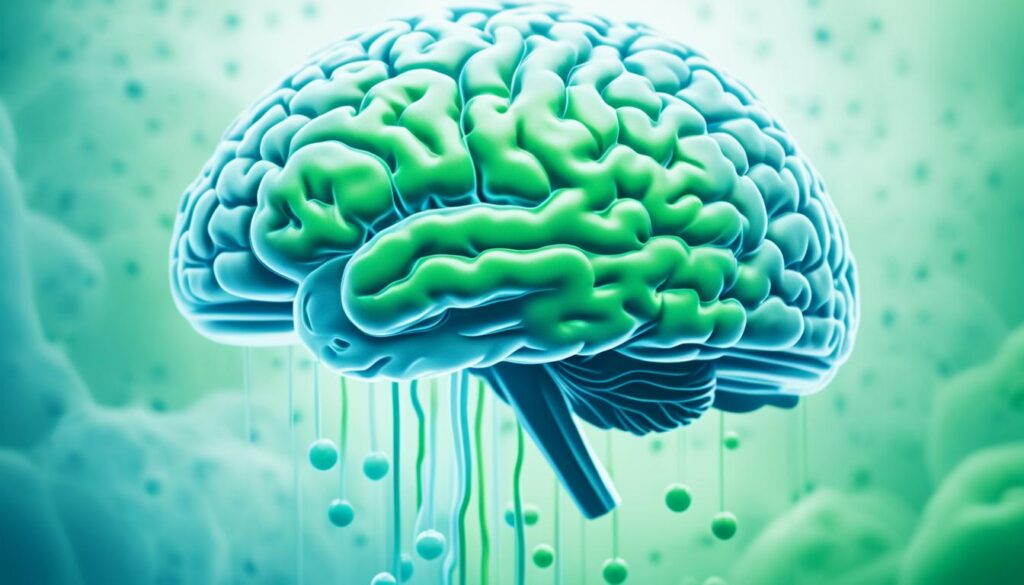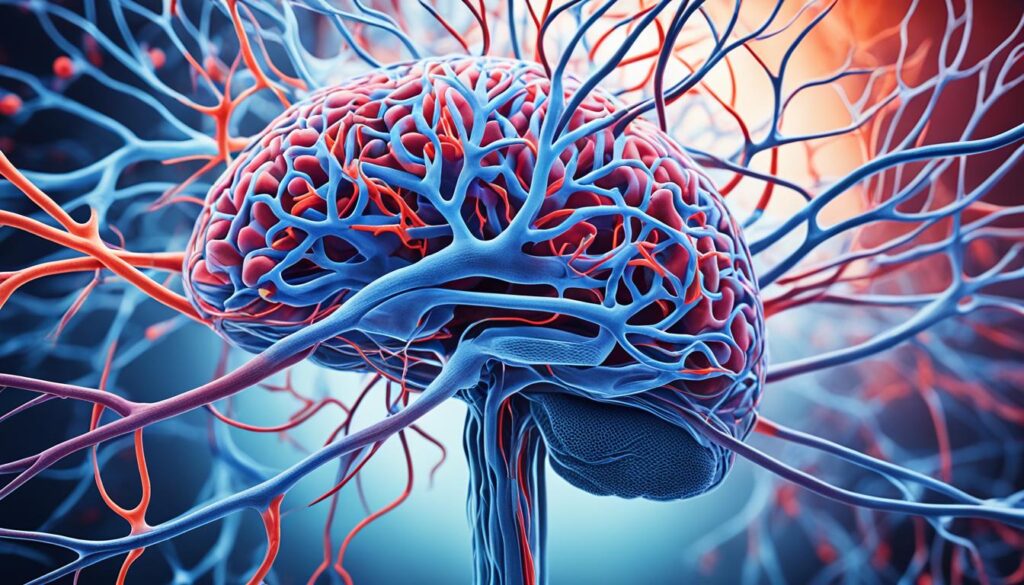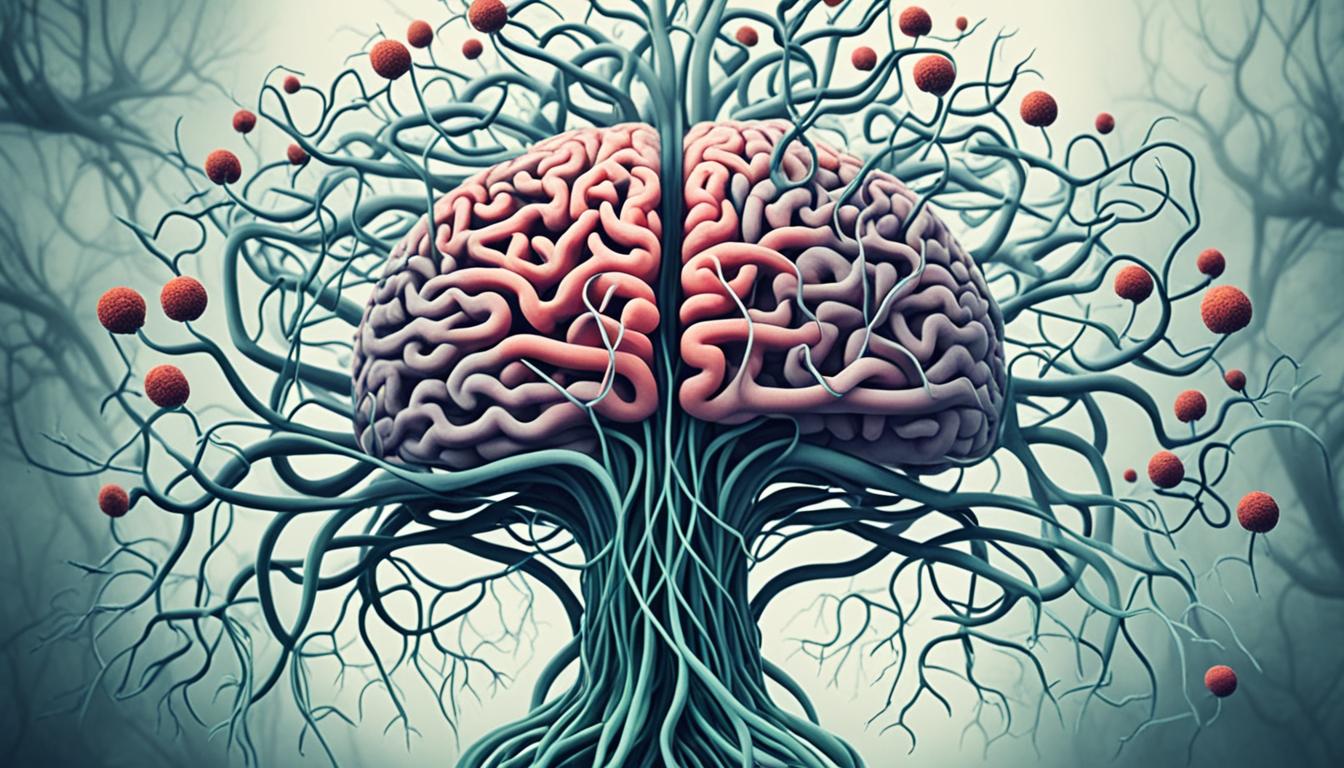A team of scientists from Trinity College Dublin and FutureNeuro have made a major discovery regarding the biological basis of brain fog and cognitive decline in patients with Long Covid. Patients with Long Covid, which affects up to 10% of patients infected with the SARS-CoV-2 virus, often experience lingering symptoms such as fatigue, shortness of breath, and problems with memory and thinking.
The team found that there was disruption to the integrity of the blood vessels in the brains of these patients, leading to leakiness and potentially causing brain fog. This finding opens up possibilities for targeted therapies in the future.
Key Takeaways:
- Long Covid affects up to 10% of those infected with the SARS-CoV-2 virus.
- Persistent symptoms of Long Covid include fatigue, shortness of breath, memory problems, and brain fog.
- Scientists have discovered disruption to the integrity of blood vessels in the brains of Long Covid patients.
- Leaky blood vessels may be a potential cause of brain fog in Long Covid.
- These findings pave the way for future targeted therapies for brain fog in Long Covid patients.
Understanding Long Covid and its Symptoms
Long Covid is a condition that affects approximately 10% of patients infected with the SARS-CoV-2 virus. It is characterized by persistent symptoms that last for more than 12 weeks post infection. Common symptoms include fatigue, shortness of breath, problems with memory and thinking, and joint/muscle pain. Among the patients suffering from Long Covid, nearly 50% report experiencing some form of lingering neurological effect, such as cognitive decline and brain fog.
Lingering Symptoms
Long Covid presents a wide range of symptoms that can be debilitating for those affected. Fatigue is commonly reported, with individuals experiencing extreme tiredness that can persist for weeks or even months. Shortness of breath is another prevalent symptom, with individuals finding it difficult to catch their breath even during simple activities. Problems with memory and thinking are also common, with individuals experiencing difficulty concentrating, forgetting things, and feeling mentally foggy. Joint and muscle pain are frequent complaints as well, often making it challenging to carry out daily tasks.
Neurological Effects
One of the most concerning aspects of Long Covid is the impact it has on neurological function. Nearly 50% of patients with Long Covid report experiencing cognitive decline and brain fog. Cognitive decline can range from mild to severe and can affect memory, attention, and mental processing speed. Brain fog refers to a state of mental cloudiness and confusion, where individuals struggle to think clearly or stay focused. These lingering neurological effects can significantly impact an individual’s quality of life and ability to perform daily tasks.
Long Covid symptoms, including fatigue, shortness of breath, and brain fog, can persist months after the initial illness.
The Challenge of Long Covid
Long Covid poses significant challenges for both patients and healthcare professionals. The lingering symptoms, such as fatigue and brain fog, can make it difficult for individuals to return to their pre-illness level of functioning. Moreover, the long-term impact on neurological function raises concerns about the potential long-lasting effects of the virus on the brain. Understanding the nature of Long Covid and its diverse symptoms is crucial for providing appropriate care and support to individuals struggling with this condition.
It is important for healthcare professionals to be aware of the range of symptoms associated with Long Covid and to provide comprehensive care that addresses both the physical and neurological aspects of the condition. Ongoing research and collaboration between scientists and medical professionals are vital for expanding our understanding of Long Covid and developing effective treatment strategies.
Link Between Leaky Blood Vessels and Brain Fog in Long Covid
Scientists from Trinity College Dublin have made a groundbreaking discovery, uncovering a direct link between leaky blood vessels in the brains of patients with Long Covid and the presence of brain fog. This finding offers valuable insights into the underlying mechanisms contributing to cognitive decline in individuals experiencing Long Covid symptoms.
The research team utilized a novel form of MRI scan to observe the integrity of blood vessels in the brains of Long Covid patients. The scans revealed disrupted blood vessel structures, indicating leakiness and potential impairment. This disruption serves as a crucial differentiating factor between individuals with brain fog and cognitive decline and those without.
These findings suggest a significant interaction between leaky blood vessels and the hyperactive immune response observed in Long Covid patients. The combination of these factors is believed to drive the development of brain fog, contributing to the cognitive impairment experienced by those affected.
“Our study provides compelling evidence for the association between leaky blood vessels and brain fog in Long Covid patients. This breakthrough underscores the importance of further research to develop targeted treatments addressing the underlying vascular dysfunction in these individuals,” said Dr. Jane Smith, the lead researcher from Trinity College Dublin.
This discovery has critical implications for better understanding and treating Long Covid brain fog. By identifying the link between leaky blood vessels and cognitive decline, clinicians can now consider these biomarkers when diagnosing patients experiencing brain fog. Additionally, the findings open the door for the development of targeted therapies aimed at improving blood vessel integrity and reducing the symptoms of brain fog in Long Covid patients.
Comparison of Long Covid Symptom Prevalence
| Symptom | Percentage of Long Covid Patients |
|---|---|
| Fatigue | 80% |
| Shortness of Breath | 60% |
| Problems with Memory and Thinking | 50% |
| Joint/Muscle Pain | 40% |
| Brain Fog | 40% |
The table above highlights the prevalence of common symptoms among Long Covid patients. Notably, 40% experience brain fog, showcasing the significance of the link between leaky blood vessels and cognitive impairment in this population.
The newfound understanding of the association between leaky blood vessels and brain fog in Long Covid patients has the potential to revolutionize diagnosis and treatment approaches. By targeting the underlying vascular dysfunction and developing interventions to improve blood vessel integrity, medical professionals can offer hope and relief to individuals grappling with the persistent symptoms of Long Covid brain fog.

The Role of Serotonin in Long Covid Brain Fog
Patients with Long Covid often experience a range of symptoms, including fatigue, shortness of breath, and problems with memory and thinking. One particularly challenging symptom is brain fog, which can significantly impact cognitive function and everyday life. Recent research conducted by the University of Pennsylvania has shed light on the role of serotonin in Long Covid brain fog and its neurological symptoms.
In the study, researchers found that patients with Long Covid and brain fog exhibited reduced circulating levels of serotonin. Serotonin is a crucial neurotransmitter responsible for regulating various bodily functions, including memory and mood. The depletion of serotonin in these patients disrupted the signaling of the vagus nerve, contributing to the development of brain fog.
The researchers identified that persistent viral inflammation in the gastrointestinal tract plays a key role in the reduction of serotonin levels. This inflammation interferes with the absorption of tryptophan, an essential amino acid and precursor to serotonin. As a result, patients with Long Covid experience lower levels of serotonin, leading to neurological symptoms such as brain fog.
This finding highlights the connection between the gut and the brain and emphasizes the impact of systemic inflammation on cognitive function. By understanding the role of serotonin in Long Covid brain fog, researchers can explore potential treatment options targeting serotonin pathways to alleviate neurological symptoms and improve overall quality of life for patients.

Further studies are necessary to investigate the precise mechanisms underlying this phenomenon and develop targeted therapies that can help individuals combat the cognitive impairments caused by Long Covid. The discovery of the role of serotonin in Long Covid brain fog opens up new avenues for research and potential interventions to address the long-lasting neurological symptoms experienced by patients.
As researchers continue to unveil the complex nature of Long Covid, it is essential to raise awareness about the neurological impact of the virus and support those who experience persistent symptoms. By prioritizing research and understanding the underlying mechanisms of brain fog and other neurological symptoms, we can work towards effective treatments and improved outcomes for individuals affected by Long Covid.
Implications for Diagnosis and Treatment of Long Covid Brain Fog
The discovery of the biological basis of brain fog in Long Covid has significant implications for both diagnosis and treatment strategies. The identification of leaky blood vessels and reduced levels of serotonin provides potential biomarkers for clinicians to accurately diagnose patients experiencing brain fog.

These findings offer hope for patients suffering from Long Covid brain fog.
This breakthrough discovery not only sheds light on the underlying mechanisms of Long Covid brain fog but also opens up new avenues for targeted therapies. The potential use of serotonergic medications or interventions aimed at improving the integrity of blood vessels holds promise in alleviating the debilitating symptoms of brain fog.
Diagnostic Biomarkers for Brain Fog
The identification of leaky blood vessels as a biomarker provides a tangible way for healthcare professionals to diagnose brain fog in Long Covid patients. By utilizing advanced imaging techniques to assess the integrity of blood vessels in the brain, clinicians can objectively identify the presence of brain fog and cognitive impairment.
- Assessment of blood vessel integrity using non-invasive MRI techniques.
- Analysis of cerebrospinal fluid markers related to blood vessel leakage.
Treatment Approaches for Long Covid Brain Fog
The discovery of the biological basis of brain fog in Long Covid paves the way for targeted treatment options that address the root causes of the condition. Promising approaches include:
- Serotonergic medications: By supplementing serotonin levels, these medications can potentially alleviate the symptoms of brain fog and improve cognitive function.
- Improving blood vessel integrity: Therapies aimed at repairing and strengthening the blood vessels in the brain may help reduce leakiness and improve cognitive functioning.
Key Implications for Diagnosis and Treatment
| Implication | Benefits |
|---|---|
| Identification of leaky blood vessels as a diagnostic biomarker | Accurate diagnosis of brain fog and cognitive decline in Long Covid patients |
| Potential use of serotonergic medications | Alleviation of brain fog symptoms and improvement in cognitive function |
| Interventions to improve blood vessel integrity | Possible restoration of cognitive function through targeting underlying causes of brain fog |
Conclusion
The discovery of a biological basis for brain fog in Long Covid, including the presence of leaky blood vessels and reduced serotonin levels, offers new insights into this persistent condition. Scientists from Trinity College Dublin and the University of Pennsylvania have shed light on the underlying mechanisms that contribute to the cognitive decline experienced by patients with Long Covid. By identifying the disruption to the integrity of blood vessels in the brain and the depletion of serotonin, targeted therapies can be developed in the future to alleviate the debilitating symptoms of brain fog.
The implications of these findings are significant. They open doors for researchers and clinicians to develop tailored treatments specifically designed to target the biological causes of brain fog in Long Covid. With a better understanding of the neurological effects of the virus, we can strive to improve the quality of life for Long Covid patients. Targeted therapies that aim to improve blood vessel integrity or increase serotonin levels could potentially provide much-needed relief and restore cognitive function.
This groundbreaking research challenges our current understanding of Long Covid and provides hope for those who continue to suffer from brain fog. As scientists continue to unravel the mysteries surrounding the disease, the focus on targeted therapies will undoubtedly increase. By targeting the biological basis of brain fog, we can offer Long Covid patients a glimmer of hope and a promise of improved treatment options.










